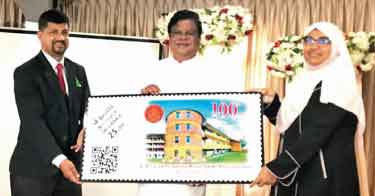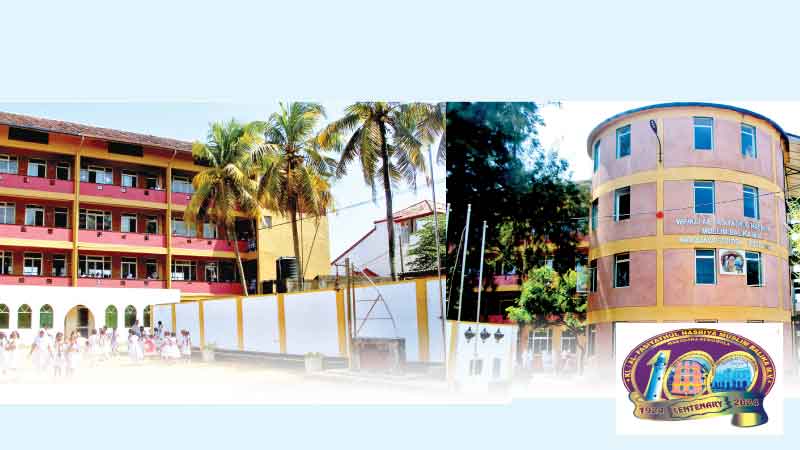Technology subjects will be introduced to Al-Fasiyathul Nasriya Muslim Balika Maha Vidyalaya – Minister Dr. Bandula Gunawardena:
Rs. 25 stamp and first day cover issued to mark centenary of school which started in 1924:

Principal
Mohamed Mushin Mushnavia
In commemoration of the centenary (1924-2024) of Al-Fasiyathul Nasriya Muslim Balika Maha Vidyalaya, the first Muslim girls’ school in Sri Lanka, in Maradana, Beruwala, in the Kalutara District, a special commemorative stamp and a first-day cover were issued recently under the auspices of the Minister of Transport, Highways, and Mass Media Dr. Bandula Gunawardena.
On that occasion, Minister Dr. Gunawardena said that on its 100th birthday, the first Muslim girls’ school should initiate Science, Technology, Engineering and Mathematics (STEM) courses. The Minister emphasised that issuing a commemorative stamp for the centenary of the first Islamic girls’ college in Sri Lanka, situated in the historic coastal town of Beruwala, where the first Islamic mosque was established, marking the initial Muslim settlement in the history of Sri Lanka, was a profoundly significant occasion.
Esteemed position
“We have had the privilege of encountering two esteemed Muslim Speakers whom we deeply respect, who have held the esteemed position of Speaker of the Parliament in our nation’s Legislature. MP Imtiaz Bakeer Markar’s father, M.A. Bakeer Markar, and M.H Mohammed. These Speakers have contributed significantly to the establishment of a distinguished Parliamentary tradition,” he said.
“One of the primary challenges encountered by this school throughout its history has been the scarcity of teachers and many essential facilities. In numerous rural areas, the shortage of teachers for tech subjects has often led students to pursue higher education predominantly in the Arts stream.
“Consequently, there was a lack of suitable job opportunities for Arts graduates from universities. Many young individuals, unable to secure a livelihood with their education, became disillusioned with their parents, the social system, and the country itself. The resulting surge of discontentment often propelled them towards various violent actions. For over three decades following independence, society has been steeped in an atmosphere of conflict. As a former Minister of Education, I firmly believe that the education system bears the primary responsibility for this state of affairs,” he said.
Expressing appreciation to the Minister for his participation in the event, Member of Parliament Imthiaz Bakeer Markar said, “The school you have visited today holds significant historical value. Additionally, the area you are visiting is of great historical importance to our country. This marks the second stamp to be issued in connection with this village. The first stamp was issued to commemorate the first Arab settlement in Sri Lanka,” he recalled.

Minister of Highways and Mass Media, Dr. Bandula Gunawardena presents a replica of the stamp and first day cover to mark the centenary of Al-Fasiathul Nasriya Muslim Balika Maha Vidyalaya, to the Principal
“Today, Al-Fasiyathul Nasriya Muslim Balika Maha Vidyalaya stands as the first Muslim girls’ school in Sri Lanka. I recollect my time as a Member of Parliament when the current President, Ranil Wickremesinghe, was invited to and held a meeting at this school. During our conversation, I reminded him that his grandfather had inaugurated the first building of this school, which initially began as a Madrasa (Islamic religious school) before evolving into a Government school.
“Viewed in this light, it becomes evident that this school holds significant importance in our history. There exists a profound connection between the inception of Muslims in Sri Lanka and the establishment of this institution,” he said.
“I recall my grandmother recounting the challenges encountered during the establishment of this school. She mentioned incidents where stones were thrown at the homes of those who initiated the school. The idea of women pursuing education was considered unimaginable at that time. There was a prevalent fear that exposure to Western education would lead to our children becoming misogynistic and potentially changing their religion. This sentiment was not confined to Muslims alone; it was present among Sinhala Buddhist and Hindu communities as well,” he said.
If we examine the journey of this school, it becomes evident that its progress is the result of the indomitable courage and tireless efforts of numerous individuals. The youth movement that emerged during the colonial period in this area played a crucial role in initiating this endeavour. Notably, S. L. H. Mohammed, A. S. L. Marikar, A. L. M. P. Mohammed, O. L. M. Wadood, M. S. Samad, P. L. M. Junaid, M. S. M. Shainul Abdeen, and M. S. M. Sharif made significant contributions to this cause, said the MP.
Sharing her perspective, the current principal of the school, Mohammed Moosheen Mashnavia, said, “Our school is a well-regarded 1C type Tamil medium school in the Beruwala division of the Kalutara region. I assumed the responsibilities of this school on November 11, 2016. Having passed the principal exam, I was appointed as the principal. At the time, I was the youngest headmistress in the teaching profession, aged just 31.”
“Upon my arrival, I encountered numerous challenges that needed to be addressed. However, I did not hesitate, and instead, I tackled each challenge head-on. My primary focus was on improving the children’s education,” she recalled.
Significant milestone

The principal with the administrative council members, teaching staff,
volunteer teachers and administrative staff
According to her, in 2018, the school achieved a significant milestone by securing first place among all Tamil medium schools in the Western Province, with a remarkable percentage of 95 percent. Additionally, it also attained first place in the relevant category and fifth place in the region overall marking significant progress over the past six years of her tenure. The Covid-19 period was especially challenging for the school, but the school managed to impart lessons to the students through online and other methods so that they could get their lessons without any interruption.
“We are currently facing a severe shortage of teachers, with only 27 teachers available to educate 1,115 children. This deficit leaves us with a shortage of 28 teachers needed to adequately meet the educational needs of our students,” she said.
The school’s vision and mission have been crafted to align with the approach of the current principal and the Management Committee. The vision is to nurture a future generation characterised by exemplary personalities, while the mission aims to equip the country with a cohort of well-rounded young Muslim women possessing religious perspectives, extensive knowledge, skills, positive attitudes, and proficiency in the three main languages, along with computer literacy. The school looks forward with optimism to the next 100 years.









